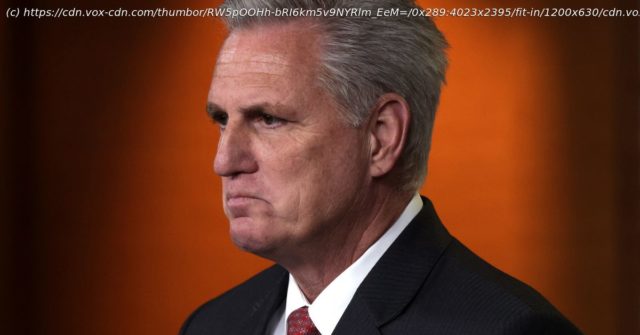Can this Congress actually pass a debt ceiling increase?
Despite the chaos currently engulfing Kevin McCarthy’s bid to become speaker of the House, the chamber’s Republicans will probably, eventually end up united around a GOP speaker candidate.
After that is when things might get really scary.
The core problem is that the House eventually needs to do some things — things that are more substantively important and more complicated than just picking a leader. Specifically, the House needs to fund the federal government, and it needs to raise the debt ceiling to prevent a potentially catastrophic default on the national debt.
Reaching an agreement with Senate Democrats and President Joe Biden is necessary for both. Yet the GOP House majority is quite narrow — they have 222 members, when 218 are necessary for a House majority. So to pass anything at all, Republican leaders have to either win over nearly all of the quarrelsome members on the party’s right flank (something that this week’s events show will be extremely difficult) or win over Democrats (something that could alienate the right and land the party right back into another contested speaker election).
The 20 House Republicans who opposed McCarthy’s speakership at some point Tuesday, denying him the majority of votes he needed to win, differ in which issues seem to move them most. Some, like Chip Roy (TX) and Scott Perry (PA), are anti-government spending ideologues. Others, like Paul Gosar (AZ) and Lauren Boebert (CO), are conspiratorial cranks. Some, like Matt Gaetz (FL), may just be mischief-making malcontents.
Yet all see an advantage in flouting the GOP establishment and what they portray as Washington politics as usual. And they’ve flexed their muscles to show that, yes, they really are stubborn enough to grind their party’s plans to a halt. So whoever is going to end up as speaker will be tasked with a seemingly impossible balancing act — maintaining enough conservative support to stay speaker, while preventing a governing disaster.
In other words, the speakership chaos could well presage a catastrophic collapse of American governance over the debt ceiling and funding issues this year — or at least a very tense situation until a deal can be worked out.This has been a consistent dynamic of House GOP majorities since the Tea Party years
Since the last time Republicans took over the House of Representatives from a Democratic majority — the Tea Party wave in the 2010 midterms under President Obama — the same problem has kept plaguing their majorities: a recalcitrant right flank that makes it difficult for them to achieve basic government tasks.
Specifically, that right flank became convinced by the idea that a Republican House should try to hold must-pass legislation hostage until the Democratic president and Senate agree to enact major conservative priorities into law.
During the Obama years, many of these conservatives were inherently suspicious of government spending bills that typically passed with bipartisan support. So they pressured party leaders to engage in high-profile showdowns with Democrats.
The first of these showdowns came over the debt ceiling, which is effectively a cap on how much new debt the federal government can issue that must periodically be raised.






